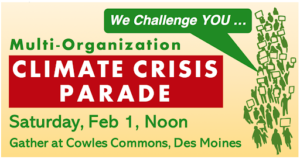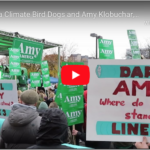Dear Friends,
The Climate Crisis Parade planned for February 1 in Des Moines is shaping up to be a major event. As of today, a coalition of 55 organizations has signed on as co-sponsors. The primary focus of the multi-faceted event is to challenge the media to do a better job covering the worsening climate crisis.
 Every four years, Des Moines is “media central” during the days leading up to the Iowa Caucuses. To act on this unprecedented opportunity for national and international coverage, the coalition is inviting participants to meet at Cowles Commons to hear influential climate voices make the climate connections the media is ignoring.
Every four years, Des Moines is “media central” during the days leading up to the Iowa Caucuses. To act on this unprecedented opportunity for national and international coverage, the coalition is inviting participants to meet at Cowles Commons to hear influential climate voices make the climate connections the media is ignoring.
Then, led by Indigenous members of the coalition including Seeding Sovereignty and Indigenous Iowa, people will march through the streets or skywalk to the Iowa Events Center, urging the media to give the global climate emergency the consistent coverage it deserves. A secondary focus of the event is to challenge presidential candidates and the general public to prioritize climate action, since our lives and our future depend on it.
Additional details will be announced over the next two weeks, and interest in the Parade is likely to build as the Caucuses approach. Go to the Climate Crisis Parade Facebook page and sign up to attend (either on the page itself or on Eventbrite). Thanks!
Here’s an overview of this week’s Fallon Forum, with Charles Goldman and me:
 1. In Des Moines this weekend, Pete Buttigieg bungled a Black Lives Matter protest. Attendees unhappy with his handling of racially charged issues in South Bend, Indiana, shouted “black lives matter” and “anti-poor, anti-black”. When Buttigieg told protesters to be respectful, some observers saw it as condescending and dismissive. It didn’t help when Buttigieg’s audience began to shout “USA, USA” to try to drown out the protesters. It reminded some of how an audience often responds at a Trump rally. For contrast: When BLM activists protested at a Sanders rally in 2016, Sanders handed them the mic. This incident may further hurt Buttigieg, and not just with African-American voters.
1. In Des Moines this weekend, Pete Buttigieg bungled a Black Lives Matter protest. Attendees unhappy with his handling of racially charged issues in South Bend, Indiana, shouted “black lives matter” and “anti-poor, anti-black”. When Buttigieg told protesters to be respectful, some observers saw it as condescending and dismissive. It didn’t help when Buttigieg’s audience began to shout “USA, USA” to try to drown out the protesters. It reminded some of how an audience often responds at a Trump rally. For contrast: When BLM activists protested at a Sanders rally in 2016, Sanders handed them the mic. This incident may further hurt Buttigieg, and not just with African-American voters. 2. Polls show that the lead in Iowa keeps changing: Biden, Warren, Buttigieg, and now Sanders. With his late surge, is Sanders on track to win the Iowa Caucuses?
2. Polls show that the lead in Iowa keeps changing: Biden, Warren, Buttigieg, and now Sanders. With his late surge, is Sanders on track to win the Iowa Caucuses?  3. Why does the mainstream media refuse to cover the candidates’ stands on DAPL? Especially noteworthy is how they’ve ignored the extensive Bold Iowa bird-dogging and protests of Amy Klobuchar at her events. One would think that Klobuchar’s support for oil and gas pipelines would not only turn off Democratic caucus goers but capture the interest of the press.
3. Why does the mainstream media refuse to cover the candidates’ stands on DAPL? Especially noteworthy is how they’ve ignored the extensive Bold Iowa bird-dogging and protests of Amy Klobuchar at her events. One would think that Klobuchar’s support for oil and gas pipelines would not only turn off Democratic caucus goers but capture the interest of the press. 4. Like Jay Inslee before him, Tom Steyer is hands down the strongest candidate on climate. Yet he polls at 2-3 percent in Iowa. Is climate just not that high a priority for Iowa Democrats, even though polls suggest it’s one of Iowa Democrats’ top two concerns (along with health care)?
4. Like Jay Inslee before him, Tom Steyer is hands down the strongest candidate on climate. Yet he polls at 2-3 percent in Iowa. Is climate just not that high a priority for Iowa Democrats, even though polls suggest it’s one of Iowa Democrats’ top two concerns (along with health care)? 5. The DNC/Corporate Media’s early (and successful) efforts to tank the campaigns of Marianne Williamson and Tulsi Gabbard are further proof that the Democratic Party hates progressives.
5. The DNC/Corporate Media’s early (and successful) efforts to tank the campaigns of Marianne Williamson and Tulsi Gabbard are further proof that the Democratic Party hates progressives.THIRD SEGMENT: Continuation of our Balkanized two-party political system could doom American democracy to another four years of Trumpism. Perhaps it’s time to consider multi-member Congressional districts — where American voters vote for more than one representative on Election Day. This would foster the growth of third parties, reduce the impact gerrymandering has had on creating our non-representative Congress and state legislatures, and increase the diversity of candidates and ideas that voters could support.
Thanks! – Ed
